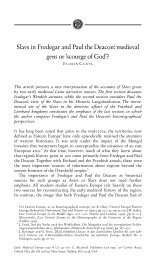A READER IN COMPARATIVE INDO-EUROPEAN MYTHOLOGY
A READER IN COMPARATIVE INDO-EUROPEAN MYTHOLOGY
A READER IN COMPARATIVE INDO-EUROPEAN MYTHOLOGY
Create successful ePaper yourself
Turn your PDF publications into a flip-book with our unique Google optimized e-Paper software.
In Sanskrit and Avestan there are many terms for 'priest', since there were many specialized<br />
kinds of priests. Etymological cognates include Skr. hótar- and Av. zaotar, which are both<br />
from *g' h ew- 'to pour (a libation)', Gr. khéō. The Germanic word for 'god' (Eng. god, Germ.<br />
Gott, Goth. guÞ, originally neuter) is often derived from this root (PIE *g' h u-tóm 'worthy of<br />
libation'), but equally possible is to derive it from the quasi-homophonous root *g' h ewH- 'call,<br />
invoke' (Skr. hávate, OCS zъvati).<br />
OCS žrъcь '(pagan) priest' is derived from the verb žrьti 'sacrifice', ORuss. žereti, from PIE<br />
*g w erH- 'praise' (Lith. gìrti 'praise', OPr. girtwei 'praise', Skr. gṛṇā́ti 'praise').<br />
SACRIFICE<br />
The functions of the PIE priest would have included the performance of various rites,<br />
including the sacrifice. The most common types of sacrifice are the libation and the slaugthter<br />
of animals; of these, the cattle, the sheep and the horse are the most prominent sacrificial<br />
animals, and there are several combinations, such as the Roman Suovetaurilia (the sacrifice of<br />
a sheep, a pig, and a bull, chiefly during the festival of Ambarvalia in May, when the<br />
sacrificial animals are led around the crops to protect them from blight).<br />
Any self-respecting sacrificer ended the sacrifice with a feast, on which the sacrificed animal<br />
was shared with the gods. This feast seems to be denoted by PIE *dapnom „sacrificial meal“<br />
(Lat. daps, ON tafn „sacrificial animal“, Arm. tawn „feast“, Hitt. LU tappala- „person<br />
responsible for court cooking“, Gr. dapánē „ostentatious expenditure“).<br />
The term for libation is PIE*spend-, hence Lat. spondeo „promise, vow“, Gr. spendō „pour a<br />
libation“, spondḗ, Hitt. išpand- „pour a libation“, TochAB spänt- „trust“. The development of<br />
meaning in Lat. spondeo (cf. also sponsa „the promised bride, fiancée“) is clear if we recall<br />
that a libation is the proper time to make a promise to the deity in expectation of a returned<br />
favor.<br />
Another root which denoted the libation was *g' h ew- > Gr. khéō, Phryg. zeuman „libation“,<br />
Skr. hu- „pour“, hótar „priest“, Arm. jawnem „offer, consecrate“, TochAB ku- 'pour'. The<br />
original meaning was perhaps less tightly tied to the religious sphere, but 'the pourer' is a



